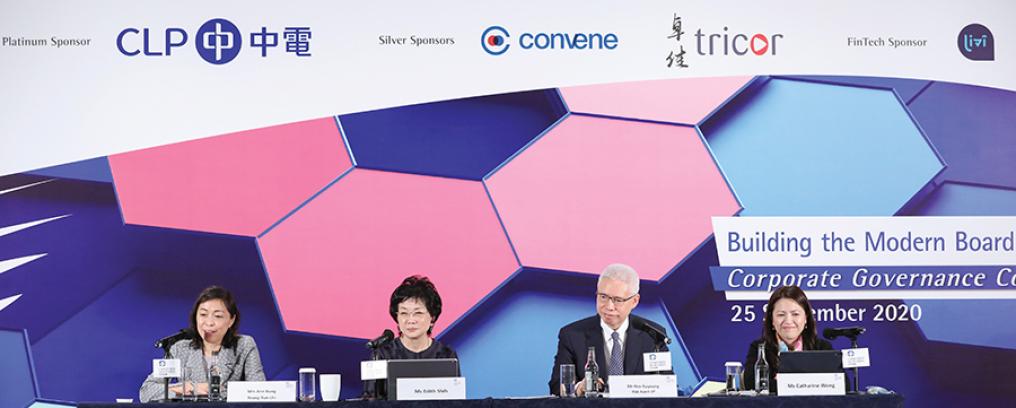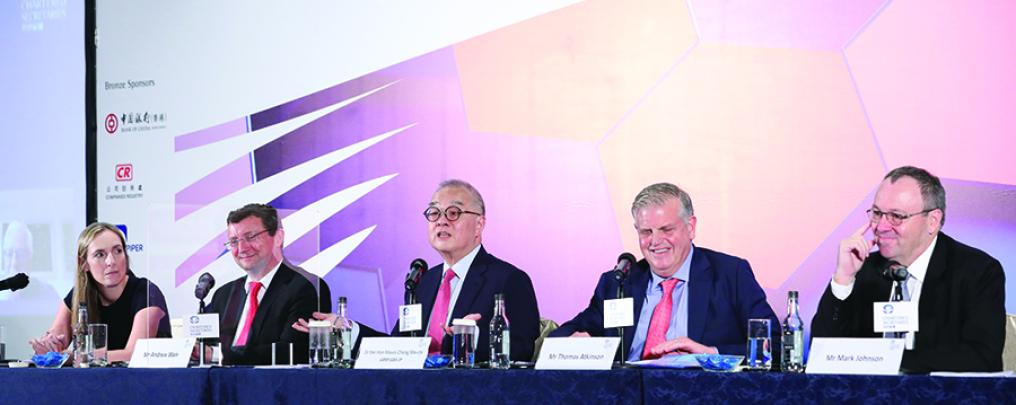New additions to the guidance note series of The Hong Kong Institute of Chartered Secretaries highlight the implications of the current COVID-19 pandemic for the work of governance professionals.
It is hard to think of any areas of the work and personal lives of governance professionals in Hong Kong that have been untouched by the current COVID-19 pandemic. New additions to the guidance note series first launched by The Hong Kong Institute of Chartered Secretaries (the Institute) in June 2016 offer guidance on the implications of the COVID-19 crisis in the areas of business ethics and crisis management in the non-governmental organisation (NGO) sector.
COVID-19 and business ethics
The sixth in the series of guidance notes published by the Institute’s Ethics, Bribery & Corruption (EB&C) Interest Group, published in August this year, offers help with the many ethical decisions organisations have been faced with during the COVID-19 pandemic.
The EB&C guidance points out that having an ethical culture helps organisations to build resilience and bounce back from crises such as the current pandemic. The Asian financial crisis in the years 1997 to 1998 and the Severe Acute Respiratory Syndrome (SARS) crisis of 2003 presented challenges for organisations, but those with high governance and ethical standards were generally better placed to retain the trust of staff and other stakeholders. ‘This is why it is important for governance professionals to push for the adoption of a firm ethical culture that can serve as risk mitigation for the next crisis that comes along,’ the guidance says.
Ethical issues relating to employees
When COVID-19 started to impact organisations in Hong Kong, one of the first practical issues to address was how to minimise the immediate risks to personnel. The guidance points out that organisations clearly have a duty to provide a safe workplace for employees and governance professionals can facilitate consideration of the various options facing businesses during the COVID-19 pandemic. Do organisations need to shut down their premises and ask employees to stay home, or allow a small group of core workers in the office, or operate a shift system to reduce contact between individuals?
The guidance emphasises that ethical considerations will be an important part of these decisions and a one-size-fits-all approach is unlikely to work because individuals’ personal circumstances will vary. Should employers make special arrangements for staff with medical conditions that render them more vulnerable to COVID-19? What about people looking after children during school closures, or who have to care for sick relatives? Moreover, should these arrangements be temporary or should they be extended in the long term? Should organisations still require employees to make business trips, or should this decision be left entirely up to individuals?
‘An ethically mature company should already be thinking about its role in stakeholder well-being, and the COVID-19 crisis brings this issue to the fore more than ever,’ the guidance points out. It adds that ‘stakeholder well-being’, and that includes the mental health of employees, is clearly in the interests of organisations – unhappy employees are likely to be less productive and take more sick leave, for example.
While some degree of give-and-take may be necessary to sustain operations, the guidance advises organisations to recognise that employees may be reluctant to return to office-based work during the COVID-19 pandemic. It recommends organisations be up front with their employees and business partners about what they expect. ‘A clear statement on the firm’s policies will go some way to reassuring employees and making them more secure in their work environment. If a company sets out its stance for all to see, people will know what to expect and can take whatever precautions they personally consider necessary,’ the guidance states.
Misfeasance – the need for extra vigilance
The guidance also addresses the need for organisations to be extra vigilant against fraud, corruption and misconduct during the COVID-19 crisis. It points out that the classic ‘triangle’ model suggests that three factors drive wrongdoing – pressure, rationalisation and opportunity.
There can be little doubt that the current pandemic will heighten the pressure on employees and external stakeholders – they might fear losing their jobs or have family members facing unemployment, for example. Moreover, ‘desperation’ could be a driver of the second point of the triangle – rationalisation. A crisis mentality of ‘every man for himself’ or ‘survival of the fittest’ may lead employees to justify fraudulent behaviour. These two factors, however, are only an issue if the third is present – opportunity. People can engage in fraud or corruption only if they have the ability to do so.
Provisional arrangements made in response to the pandemic – adopting work-from-home arrangements for example – may mean that the normal checks and balances may not be functional. ‘In normal times, organisations rely on controls and governance structures that aim to remove or minimise such opportunities, now they must review their positions and reinforce controls that have been damaged by business disruption,’ the guidance states.
Ethical decisions cannot be outsourced
Finally, the guidance emphasises that ethical decisions cannot be outsourced. Organisations can certainly rely on official advice, for instance by opening and closing premises in line with Hong Kong government offices, or relying on safety advice from the World Health Organization. These public bodies are likely to be better informed than the average individual or business, but where organisations operate in several different countries, they will likely be getting conflicting guidance from different governments. Moreover, individual organisations must take responsibility for their own actions and public opinion is unlikely to be forgiving of those that find themselves in difficulties and fall back on the excuse that they left decision-making to others. The guidance also makes the point that organisations should form their own interpretation and set out a clear policy for employees, customers and other stakeholders.
The latest EB&C guidance gives governance professionals help with many of the practical issues that organisations are facing during the COVID-19 crisis. Ultimately, there are no right or wrong answers and no one-size-fits-all approach to ethics, but the guidance will certainly help practitioners think more widely about the ethical issues they are facing and their ramifications for good governance.
Crisis management in the NGO sector
In general, the NGO sector has been hit particularly hard by the COVID-19 pandemic. As the economy takes a downturn, monetary support from donors and funders has become increasingly hard to come by. Existing donors are also being inundated with gifting requests. In these difficult times, the real issue for many NGOs is how to convince their donors to keep supporting their operations and projects. The problem is especially acute for non-subvented NGOs which are facing grave financial difficulties.
The seventh in the series of guidance notes by the Institute’s Public Governance Interest Group (PGIG), published in September this year, offers practical advice on how NGOs can address these challenges. Its main theme is that those NGOs that are best able to engage in stakeholder communication with their donors and show that they have good governance will be in a better position to obtain donor funding. It therefore focuses on the meaning of good governance in the NGO sector and provides tips on stakeholder communication with donors as part of crisis management during the pandemic.
Good governance is more than regulatory compliance
It is not uncommon for NGOs, when discussing their approach to governance, to rely on a statement to the effect that they comply with ‘all applicable rules and regulations’. The guidance points out that such statements betray a misunderstanding of governance. ‘We often hear NGOs make such a statement, but all NGOs have to comply with applicable laws and regulations so there is nothing special in stating this. This is more likely to turn away donors, especially the more sophisticated donors,’ the guidance says.
Regulatory compliance is a necessary part of the ‘social contract’ applicable to all organisations. An NGO cannot give and/or receive unauthorised kickbacks in relation to getting in and/or using donor funds. That would be an ICAC criminal case. There could also be civil consequences on the giver and taker of bribes. Good governance goes beyond regulatory compliance. Among other things, it is about how well managed the organisation is and whether there is proper risk management in relevant areas, including addressing compliance, ethical, operational, and reputational risk. Ideally, the guidance points out, decision makers will set the tone from the top – ensuring that good governance is adopted as part of the organisation’s culture through policies and procedures and staff training.
Stakeholder communication in the COVID-19 era
As mentioned above, it is particularly critical for NGOs to get their stakeholder communications right during the COVID-19 crisis. The PGIG guidance emphasises the need for communications with donors to be full and frank. NGOs should communicate what they aim to achieve, how they intend to achieve their goals and the impacts that these will have on people and/or society.
The guidance points out that NGOs often assume that donors know more about the NGO’s mission and projects than is in fact the case. ‘Donors, like many of us, can be forgetful. Be prepared to repeat the basics – for example, who you aim to help, how you go about doing that, where your projects are located and what are the expected outcomes/impacts. There is no harm to be repetitive in what you are doing at your NGO,’ the guidance states.
In addition to promoting the NGO’s successes, stakeholder communications should address negative issues as well – this might include a discussion of operational risks and the limitations of the NGO’s work in reaching all of the target beneficiaries for example. ‘By engaging your donor on both the good and the bad, and being honest, you are engaging in full and frank transparent disclosures. You will gain a lot of respect in being factual and honest as to your successes and challenges, and how you have overcome these to be where you are. It serves to show the perseverance of your NGO, which would gain donors’ respect,’ the guidance says.
Donors may also be interested in how much of the NGO’s expenses were administration-related. The guidance recommends full disclosure of this information. ‘Be prepared to have the figures and, more importantly, how these compare with your peers. Do not be afraid/defensive to disclose your financials and administration expenses levels. It is more important that these are justifiable. For any properly organised NGO, there is an administrative expense range so do try to find out how you compare to your peers,’ the guidance says.
The guidance notes reviewed in this article are available from the Publications section of the Institute’s website: www.hkics.org.hk.
SIDEBAR: A guidance round-up
2020 has been a busy year for the Institute’s Interest Groups. In addition to the guidance notes featured in the main article, this year also saw the publication of new guidance by the Institute’s Takeovers, Mergers and Acquisitions Interest Group and Company Law Interest Group.
Public takeovers in Hong Kong. The fifth in the series of guidance notes issued by the Institute’s Takeovers, Mergers and Acquisitions Interest Group, published in June this year, addresses the principal issues surrounding mergers and acquisitions where the target is a public company.
Compliance obligations update. The regulatory landscape in Hong Kong has changed rapidly in recent years and the fourth guidance note by the Company Law Interest Group, issued in July this year, serves as a useful reminder of the basic ongoing compliance obligations for companies (public and private) in Hong Kong. It provides a summary, for example, of the filing deadlines for statutory forms, as well as financial accounts and reports, as required under the Hong Kong Companies Ordinance and the listing rules.
Statutory amalgamation of Hong Kong companies within a group. The fifth guidance note by the Company Law Interest Group, also issued in July 2020, addresses the compliance requirements for the statutory amalgamation of Hong Kong companies within a group. Statutory amalgamation is the legal process by which the undertaking, property and liabilities of two or more companies merge and their shareholders become the shareholders of the amalgamated company. The guidance note provides an overview of the compliance requirements for carrying out a statutory amalgamation under Part 13, Division 3 of the Companies Ordinance.
The guidance notes mentioned above are available from the Publications section of the Institute’s website: www.hkics.org.hk.
SIDEBAR: Credits
The Institute would like to express its thanks to all those involved in the Interest Groups set out below (membership is as at date of publication).
Company Law Interest Group
Benita Yu (Chairman), Angela Mak FCIS FCS, Cathy Yu FCIS FCS, Loretta Chan FCIS FCS, Caron Lee FCIS FCS and Wendy Yung FCIS FCS.
Ethics, Bribery & Corruption Interest Group
Dr Brian Lo FCIS FCS (Chairman), Anna Lam, Jeremy Birch, Michael Chan, Ralph Sellar and William Tam.
Public Governance Interest Group
April Chan FCIS FCS (Chairman), Lau Ka-shi BBS, Stella Ho, Stella Lo FCIS FCS(PE), Rachel Ng ACIS ACS, Samantha Suen FCIS FCS(PE) and Margaret Yan.
Takeovers, Mergers and Acquisitions Interest Group
Michelle Hung FCIS FCS (Chairman), Dr David Ng FCIS FCS, Henry Fung, Kevin Cheung, Lisa Chung, Patrick Cheung and Philip Pong.



